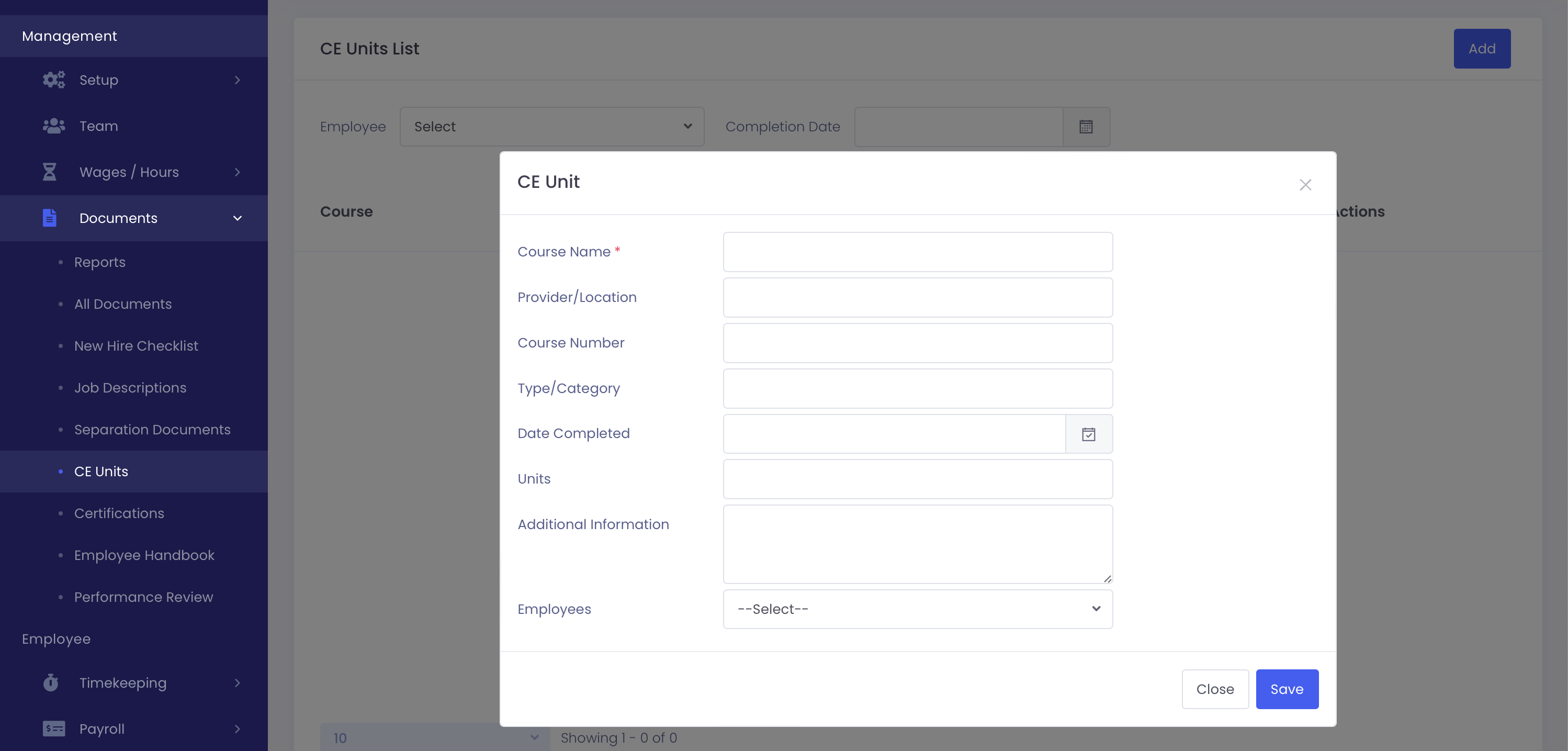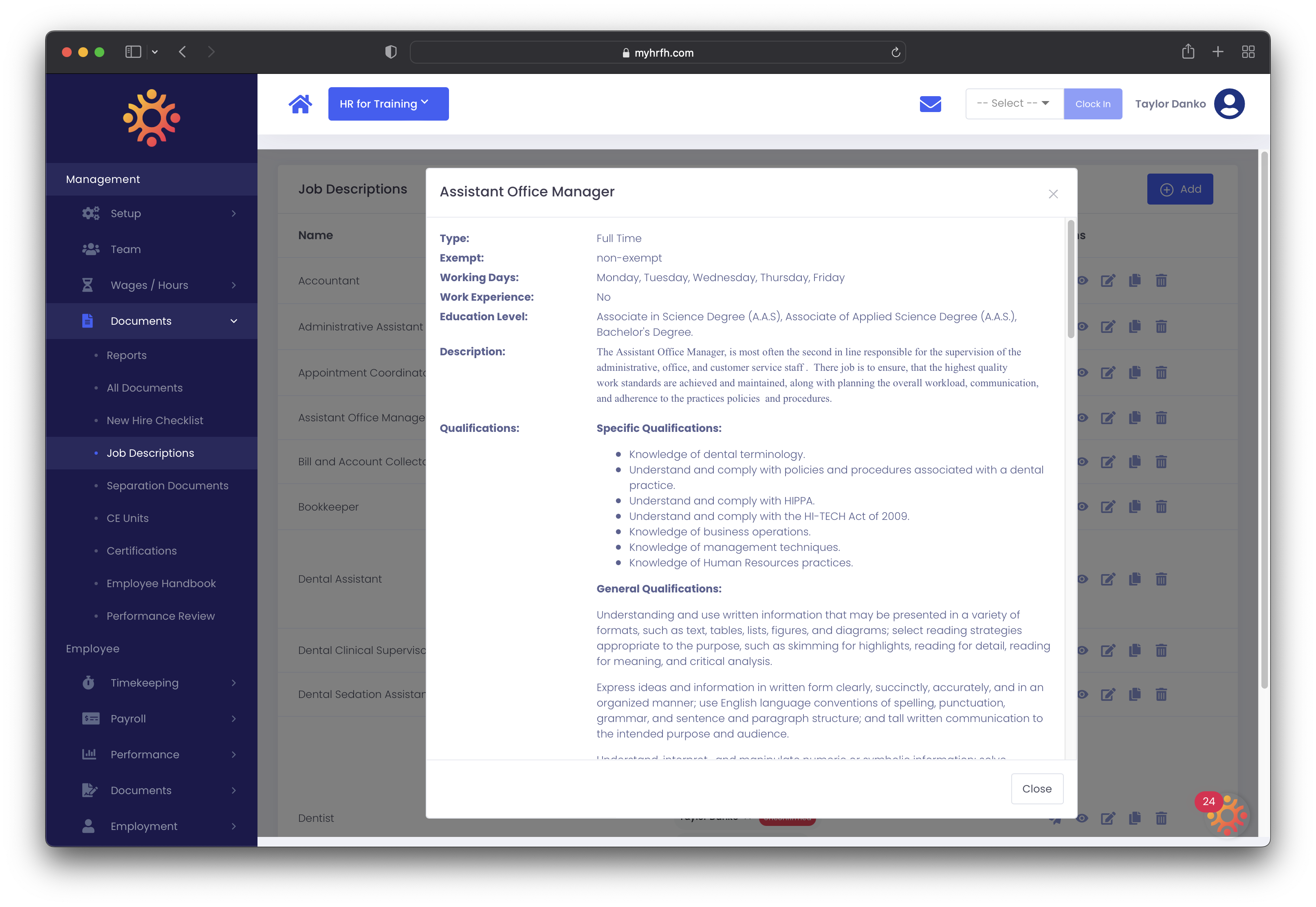The dental industry is rapidly evolving, and the roles within a dental practice are no exception. The front desk and receptionist positions are vital for managing the administrative and customer service aspects of a dental practice. In this blog post, we will discuss the key differences between dental front desk and receptionist positions, delve into the roles and responsibilities for each, and explore the requirements, skills, and salary for these positions.
Defining Dental Front Desk and Receptionist Roles
Even though the roles may sometimes overlap, and both positions require a team player attitude, excellent communication skills, and customer service, it’s essential to understand the key differences between a dental front desk position and a receptionist role in a dental office.
Enjoy pre-made job descriptions for dental positions in the HR for Health software
Dental Front Desk Professionals
Dental front desk professionals often act as administrative managers. They handle more in-depth tasks that require a thorough understanding of dental practices and procedures. Their responsibilities often include:
- Patient Records Management: Dental front desk professionals are often in charge of managing patient records, ensuring all crucial information like health histories, insurance details, and treatment plans are accurately recorded and updated.
- Financial Management: The dental front desk handles all financial processes, including payments, insurance claims, billing issues, and financial counseling for treatments. They’re often also responsible for managing accounts receivable and payable.
- Appointment Coordination: They also handle scheduling and coordinating patient appointments, ensuring to optimize the dentist’s time efficiently, and manage any changes or cancellations effectively.
- Staff Coordination: The dental front desk often serves as a liaison between different departments, coordinating with dental assistants, hygienists, and dentists to ensure seamless operation.
Dental Receptionists
On the other hand, dental receptionists are often the first point of contact for patients. Their primary role revolves around providing exceptional customer service. Their responsibilities usually include:
- Welcoming every Patient: Receptionists greet the patients as they arrive, making the first impression that sets the tone for the rest of their visit. They set an inviting and professional atmosphere for everyone who walks into the dental practice.
- Handling Inquiries: Dental receptionists manage all incoming calls and emails, answering patients’ questions regarding treatments, appointments, and any other queries.
- Initial Appointment Setting: Often, receptionists are the ones who initially schedule patients’ appointments. They ensure all necessary information has been recorded correctly.
- Waiting Area Management: They manage the waiting area, ensuring it is clean, organized, and comfortable for patients.
While these are broad strokes, remember, dental offices often have unique workflows, and job descriptions can vary, with some overlap based on the needs of the practice.
Requirements, Skills, and Experience
Dental Front Desk
- High school diploma or equivalent is required.
- Familiarity with dental insurance or medical billing is an asset.
- Strong computer and data entry skills.
- Proficiency with dental practice management software.
- Excellent communication and organization skills.
Receptionist
- High school diploma or equivalent is required.
- Prior experience in customer service or reception is preferred.
- Strong computer and data entry skills.
- Excellent verbal communication, multitasking, and problem-solving abilities.
- Ability to maintain confidentiality and professionalism.
Average Salary
The average salary for dental front desk professionals in the United States ranges from $33,000 to $40,000 annually, while dental receptionists earn an average salary of around $28,000 to $35,000 per year. The overall pay scale depends on factors such as professional experience, location, and the size of the dental practice.
In addition, the dental front desk professional’s salary can vary depending on the type of practice. For example, a large, busy general practice may pay more than a small office that doesn’t see many patients each day.
Tip: Track Training and CE Units
Appropriately managing your dental practice employees’ skillset and expertise is essential for a thriving practice and ensuring top-notch patient care. The HR for Health Software makes it simple for practices to track and manage training and continuing education (CE) units for dental practice positions. Here’s how HR for Health Software can assist your dental practice in this regard:
Training and CE Units Management
With HR for Health, dental practices can manage and track employee training programs and Continuing Education Units (CEUs) in an organized and efficient manner. The software provides an easy-to-use interface that allows you to:
- Record individual training and CE courses: Simply input a team member’s training sessions and CE courses, which will be added to their individual profile. This helps maintain an easily accessible and accurate history of every employee’s completed and ongoing training sessions.
- Track course completion: HR for Health Software enables you to record and monitor course completion status and results, ensuring that you’re aware of staff members who have pending or upcoming coursework.
- Monitor CEU expiration: For CEUs with expiration dates, the software helps you keep track of upcoming expiration deadlines, making it easy to plan for timely course renewal.
- Manage staff licensure: HR for Health Software offers a centralized system to manage staff licensure data required for CE related compliance.
- Customize notifications and alerts: With the ability to create custom notifications and alerts, you and your employees can stay informed about due dates and deadlines, ensuring that no one misses an essential training or CEU renewal.
- Generate reports: HR for Health Software lets you create detailed and customized reports based on your staff’s training and CE summaries. These reports can help you identify gaps and areas where further training and education are needed, contributing to your dental practice’s overall professional development and success.
 Track employee CE units and certifications with HR for Health software
Track employee CE units and certifications with HR for Health software
Incorporating HR for Health Software into your dental practice’s management routine not only enriches your staff’s professional growth but also upholds your practice’s regulatory compliance to maintain licensure and certifications.
Dental Industry Staffing Trends in the Modern Age
The dental industry workforce is being shaped by a range of emerging trends, affecting the recruitment and retention of dental front desk professionals, receptionists, and other staff. Here are some of the current trends influencing dental industry staffing strategies:
- Rising Demand for Dental Services: One of the most significant factors is the growing demand for dental services due to population growth and increased dental health awareness. As a result, dental practices require more staff to meet this demand, leading to a surge in hiring for all dental industry positions, including front desk and receptionist roles.
- Increasing Digitization: The role of technology in dentistry extends beyond the chair. The digital transformation in the industry has streamlined the operations of dental offices, reshaping the roles of dental professionals in the process. Understanding and navigating these digital tools is becoming an essential skill for all office staff members.
- Greater Focus on Person-First Experiences: Dentistry is in a shift towards a person-first experience, with practices focusing on providing personalized services and better patient care. This shift emphasizes the need for skilled front desk professionals and receptionists who can deliver exceptional customer service while managing administrative tasks effectively.
- Upskilling and Training: With the evolution of roles within the dental industry, there’s an increasing demand for professional development and training. Practices are investing more in employee learning to equip their staff with necessary skills, from digital savviness to patient management.
- Flexible Work Arrangements: The aftermath of COVID-19 has urged dental practices to accommodate more flexible working hours. Hybrid work schedules are becoming more common, blending in-office hours with remote work to maintain safe working conditions and improve employee satisfaction.
- Emphasis on Employee Wellness: Amid a global health crisis, there’s heightened awareness and prioritization of employee health and wellness. Dental practices are focusing more on creating supportive work environments and mitigating workplace-induced stress.
- Salary Transparency: With the increasing competition to hire and retain top talent, many practices have started to be more transparent about wages and benefits, aiming at more equitable pay models. This openness is expected to continue as part of a larger move towards more accountable and transparent workplaces across every sector.
Another Option: Utilizing Temp Agencies for Dental Practice Staffing
Staffing in a dental practice can be unpredictable due to personal leave, holiday rushes, sudden departures, or an unexpected influx of patients. In such cases, temporary staffing agencies prove to be incredibly beneficial. Here are the key benefits of utilizing a temp agency for dental practice positions:
- Coverage for Short-Term Needs: Temp agencies can quickly fill positions covering vacation, sick leave, maternity leave, or during peak business times, ensuring that the office functions smoothly without any disruptions.
- Flexibility: Temp agencies provide flexibility, allowing dental practices to scale up or down depending on the current needs and patient flow. During busier times, additional staff can be brought in without the commitment of a permanent contract.
- Reduced Hiring Process Time: Temp agencies handle the recruitment process, freeing up your administrative team to focus more on patient care. The agencies generally handle job posting, resume screening, preliminary interviews, and reference checks, which can be very time-consuming when done in-house.
- Access to Qualified Professionals: Temp agencies often have a pool of experienced and trained professionals ready to start work immediately. This mitigates the risks of under-staffing and ensures that the quality of care provided to the patients isn’t compromised.
- Opportunity for Evaluation: Hiring a temp can be a great way to evaluate a potential new team member. It gives your team a chance to assess the temporary staff in real-life work situations before making a long-term commitment.
Using a temp agency effectively eliminates the hassles of rush hiring and ensures that dental practices have skilled staff on hand, when and as they need them.
Next Steps
Optimizing your dental practice’s administrative and customer service operations is vital for success. By investing in cutting-edge solutions like HR for Health Software, you can manage dental front desk and receptionist tasks efficiently and professionally. HR for Health helps you to hire and train the best talent, keep up with the latest dental industry trends, and dedicate more attention to offering exceptional patient care.Schedule a demo today to learn more about optimizing your dental practice’s management with HR for Health.
HR for Health is the leading dental practice management software. We provide a range of solutions to help you manage your staff, schedule appointments and patient care needs, and improve operations. Our products are designed with the needs of dental offices in mind, so you can focus on what matters most—offering exceptional patient care.
FAQs: Job Descriptions for Dental Front Desk and Receptionist Positions
Q1: What are the primary responsibilities of a dental front desk professional?
A1: Dental front desk professionals handle patient records management, financial management, appointment coordination, and staff coordination. They are responsible for managing administrative tasks and ensuring the smooth operation of the dental practice.
Q2: What skills are required for a dental receptionist?
A2: Dental receptionists need excellent verbal communication, multitasking, and problem-solving abilities. They should also have strong computer and data entry skills and maintain confidentiality and professionalism.
Q3: What is the difference between a dental front desk professional and a dental receptionist?
A3: While both roles require excellent communication and customer service skills, dental front desk professionals handle more in-depth administrative tasks, such as managing patient records and financial processes. In contrast, dental receptionists focus on providing exceptional customer service, greeting patients, handling inquiries, and managing the waiting area.
Q4: What are the educational requirements for dental front desk and receptionist positions?
A4: Both positions typically require a high school diploma or equivalent. Dental front desk professionals may benefit from familiarity with dental insurance or medical billing, while prior experience in customer service is preferred for dental receptionists.
Q5: How much do dental front desk professionals and receptionists earn annually?
A5: The average salary for dental front desk professionals ranges from $33,000 to $40,000 per year, while dental receptionists earn between $28,000 and $35,000 annually. Salaries depend on factors such as experience, location, and the size of the dental practice.
Q6: What are the current staffing trends in the dental industry?
A6: Key trends include rising demand for dental services, increasing digitization, a greater focus on person-first experiences, upskilling and training, flexible work arrangements, emphasis on employee wellness, and salary transparency.
Q7: How can HR for Health Software help manage dental practice employees?
A7: HR for Health Software helps manage and track employee training programs and Continuing Education Units (CEUs), monitor course completion and CEU expiration, manage staff licensure data, customize notifications and alerts, and generate detailed reports on staff training and CE summaries.
Q8: What are the benefits of using a temp agency for dental practice staffing?
A8: Temp agencies provide coverage for short-term needs, flexibility, reduced hiring process time, access to qualified professionals, and an opportunity to evaluate potential new team members before making long-term commitments.



